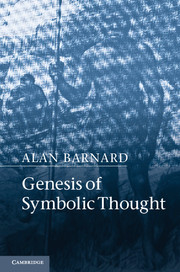3 - Kinship, sociality and the symbolic order
Published online by Cambridge University Press: 05 August 2012
Summary
In their seminal paper, Hockett and Ascher (1964) explained human society through its emergence from what we now call hominin society. I prefer to begin much later, with the evolution of Homo sapiens from H. heidelbergensis or H. rhodesiensis. Not much can be said about the social organization of any human ancestors directly from the archaeological record, but we can infer some things through comparative primatological studies, and through a number of theoretical works in both archaeology and social anthropology since the 1970s (see Barnard 2011: 18–32). We can also see it through comparisons among present-day human societies, and this will be my main focus.
At the very least, we should be able to assume that the attributes common to all human societies must lie at the base of H. sapiens sociality. Furthermore, I believe that those attributes common to all hunter-gatherers, but not to non-hunter-gatherers, can tell us something inherent in that lifestyle that the rest of us (the non-hunter-gatherers) have lost. I have recently written on this (e.g., Barnard 2010b), and my argument is that during the Neolithic transition we non-hunter-gatherers literally lost something of our humanity. This chapter explores the possibilities, and it tells what we know about things like decision-making, family and band structures and inter-group relations among fully human, fully ‘modern’, hunter-gatherers. There is, of course, no possibility of meeting any other kind, although we know that humans who were not quite like humans today did exist within the last few hundred thousand years. It is worth remembering that all humans alive today not only speak fully modern languages, but have done so since long before computers, literacy or the domestication of animals and plants. Language, in all its beauty, richness of vocabulary and grammatical complexity, was completely a hunter-gatherer invention. Knowing this will lead us to the possibilities we might envisage for fully modern hunter-gatherer societies in early stages of development, and towards an understanding of sociality among early symbolic humans.
- Type
- Chapter
- Information
- Genesis of Symbolic Thought , pp. 40 - 58Publisher: Cambridge University PressPrint publication year: 2012



